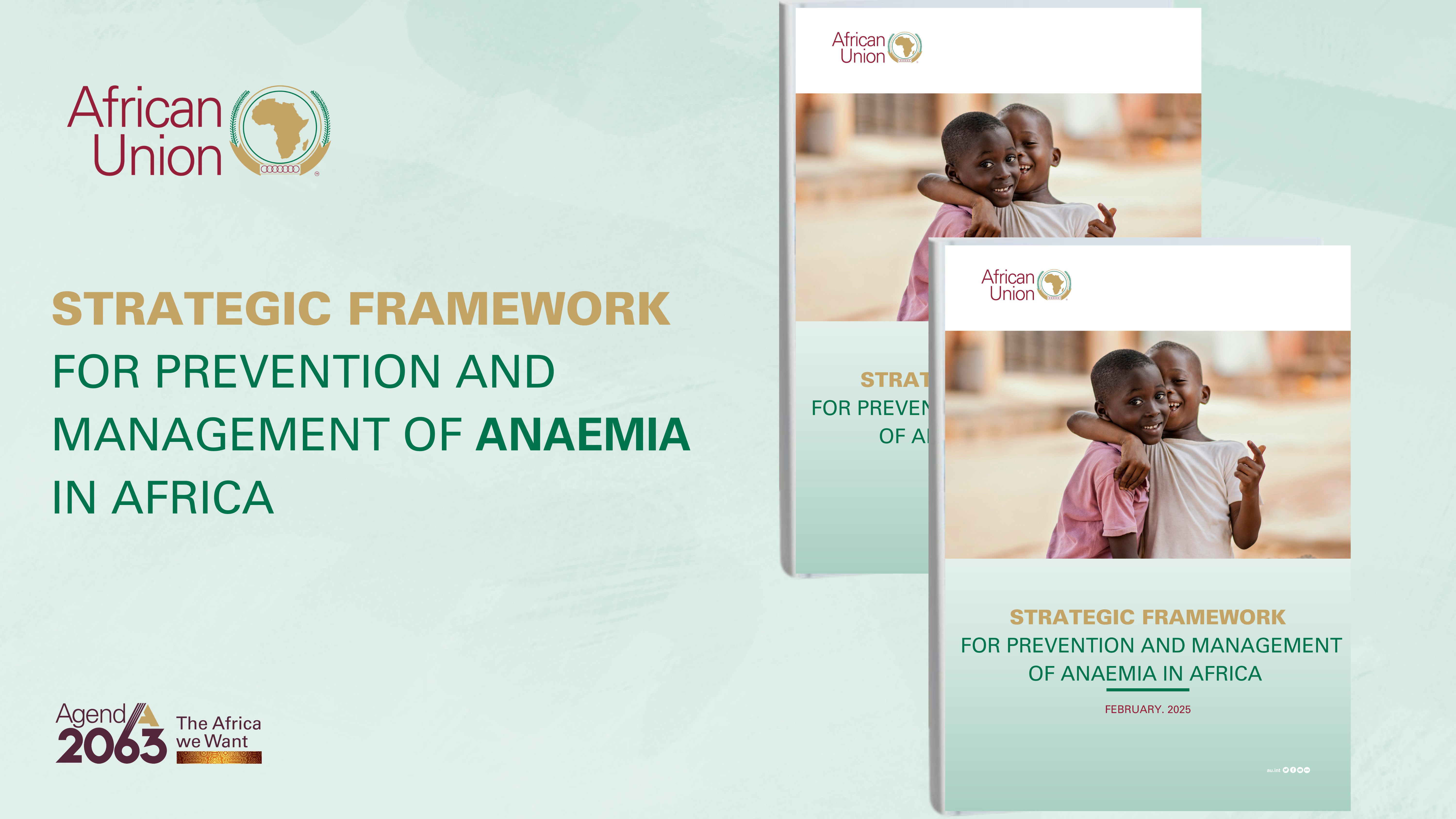Stories
Girls’ club boosts confidence and takes on malnutrition
October 4, 2024
WP_Term Object
(
[term_id] => 48
[name] => News
[slug] => all-news
[term_group] => 0
[term_taxonomy_id] => 48
[taxonomy] => news-category
[description] => Stay up to date on our announcements, newest projects and partnerships, and news about how we’re making a difference in the lives of people around the world.
[parent] => 0
[count] => 276
[filter] => raw
)
African Union announces continental framework for tackling anaemia in Africa at Heads of State Summit in Addis Ababa
On the margins of the African Union Summit, the African Union, with support from Nutrition International and the World Health Organization, unveiled the Strategic Framework for Anaemia Prevention in Africa. With a bold commitment to halving anaemia rates by 2035, the framework provides AU member states with a comprehensive, multisector roadmap to tackle one of the continent's most persistent and costly public health challenges: anaemia.
Posted on February 14, 2025
Addis Ababa, ETHIOPIA – The African Union (AU), with support from Nutrition International and the World Health Organization (WHO), launched the Strategic Framework for Anaemia Prevention in Africa, aimed at tackling one of Africa’s most persistent and costly public health challenges. The unveiling took place during the high-level side event titled “From Policy to Action: Towards a Common Position to Address Malnutrition in Africa.” On the margins of the African Union Summit, where African leaders, including ministers and heads of state, convened to discuss strategies for accelerating progress in anaemia prevention.

Anaemia, a condition that affects millions across the continent, is often mischaracterized as a simple iron deficiency. However, it is a complex health issue driven by multiple factors, including nutritional deficiencies, malaria, parasitic infections, chronic diseases, gynecological and obstetric conditions, and inherited blood disorders. Beyond these medical causes, anaemia is exacerbated by broader societal challenges such as gender inequities, poverty, food insecurity, and limited access to healthcare and sanitation services.
“Ending anaemia is not just a health priority — it is an economic and social imperative. With the right investments and partnerships, we can secure a healthier future for millions of Africans.
— Ambassador Minate Samate, African Union Commissioner for Health and Humanitarian Affairs
Despite decades of global efforts, progress in reducing anaemia remains slow. In Sub-Saharan Africa, the prevalence of anaemia among children under five only slightly declined from 62.2% in 2012 to 60.6% in 2019, while 101.1 million children continue to be affected. Among women and adolescent girls, anaemia rates remain alarmingly high, with an estimated 116.7 million new cases emerging each year. As of 2021, all AU Member States were off course to reach the Africa Regional Nutrition Strategy 2015-2025 and global nutrition target to reduce anaemia in women of reproductive age (15-49 years), with 17 Member States having achieved some progress towards the target and 36 Member States showing no progress towards the target.
Amb. Minata Samate, AU Commissioner for Health and Humanitarian Affairs, stressed the significance of this moment. “The launch of this framework represents a defining moment for Africa. Ending anaemia is not just a health priority — it is an economic and social imperative. With the right investments and partnerships, we can secure a healthier future for millions of Africans.”
“The AU’s new framework provides a strategic path forward, ensuring that governments and partners take a holistic, integrated approach to prevention and management. WHO stands ready to support this critical initiative.
— Dr. Tedros Adhanom Ghebreyesus, Director-General, World Health Organization
The Strategic Framework for Anaemia Prevention in Africa provides a comprehensive, multi-sectoral approach to address anaemia across the continent. It aligns with the WHO Comprehensive Framework for Action and the African Health Strategy (AHS) 2016-2030, focusing on:
With a commitment to halving anaemia rates by 2035, the AU is positioning this effort as a key pillar of Agenda 2063’s vision for a well-nourished and healthy African population. The upcoming Nutrition for Growth (N4G) Summit in March will provide an opportunity for global leaders to align behind this strategy and mobilize resources for its implementation.
Dr. Tedros Adhanom Ghebreyesus, Director-General of WHO, emphasized the importance of a coordinated global response. “Anaemia is a silent crisis that weakens the foundation of societies. The AU’s new framework provides a strategic path forward, ensuring that governments and partners take a holistic, integrated approach to prevention and management. WHO stands ready to support this critical initiative.”
“Thanks to the African Union’s leadership on nutrition, we have the evidence, we have the solutions, and now we have a comprehensive strategy that brings them together to guide a new agenda for action.
— Joel Spicer, President and CEO, Nutrition International
The economic toll of anaemia on Africa is equally staggering. According to Nutrition International’s Cost of Inaction Tool, anaemia results in an annual loss of USD $8.6 billion in productivity and increased healthcare expenditures, translating to 0.4% of the continent’s total income. Furthermore, anaemia impairs cognitive development in children, reduces workforce productivity, and heightens risks for maternal and neonatal complications.
Joel Spicer, President and CEO of Nutrition International, highlighted the urgency of investment. “Thanks to the African Union’s leadership on nutrition, we have the evidence, we have the solutions, and now we have a comprehensive strategy that brings them together to guide a new agenda for action. This could not be coming at a better time. What’s needed next are costed action plans at country level and financing from multilateral development banks, donors and partners backed up by civil society. With collective focus and action on anaemia, we can remove a major obstacle on the road to Africa’s continental ambitions.”
As the world gears up for the Nutrition for Growth Summit in Paris, France, in March 2025, Africa is ready to lead the charge against anaemia. Governments, international partners and donors must step up and seize this opportunity to drive bold action. The cost of inaction is simply too great.